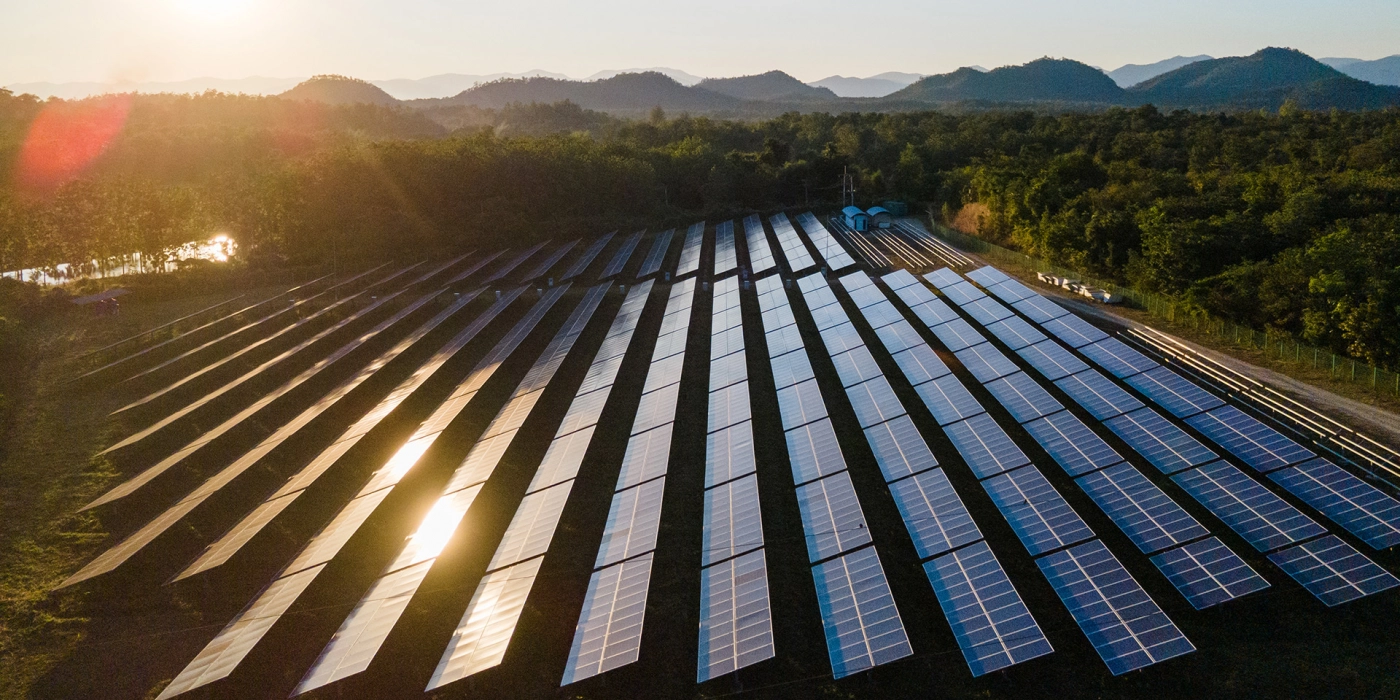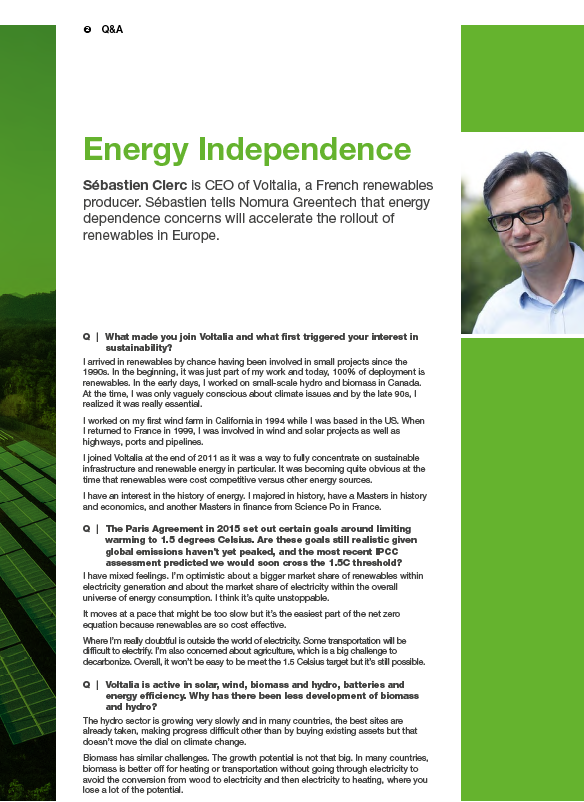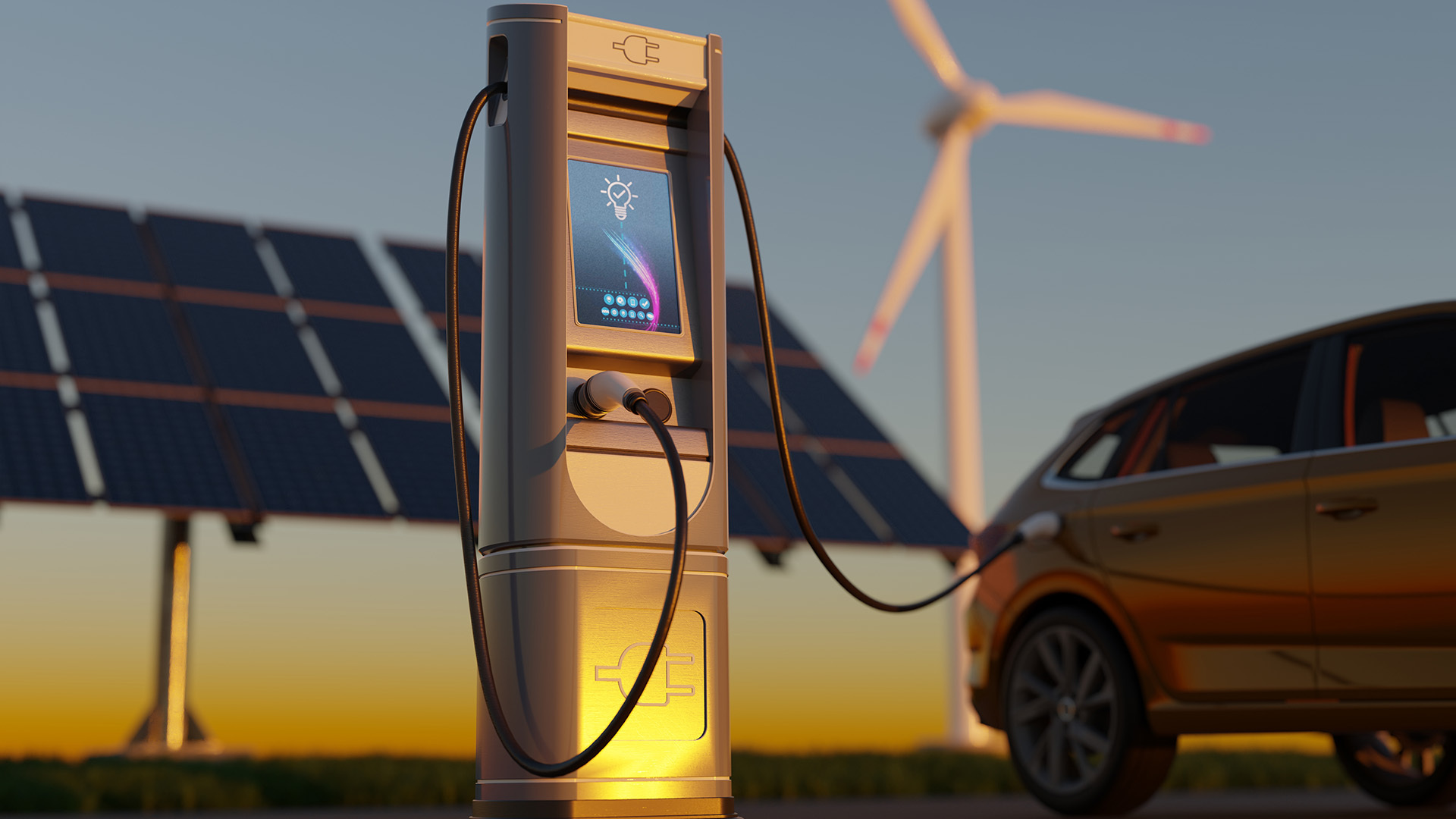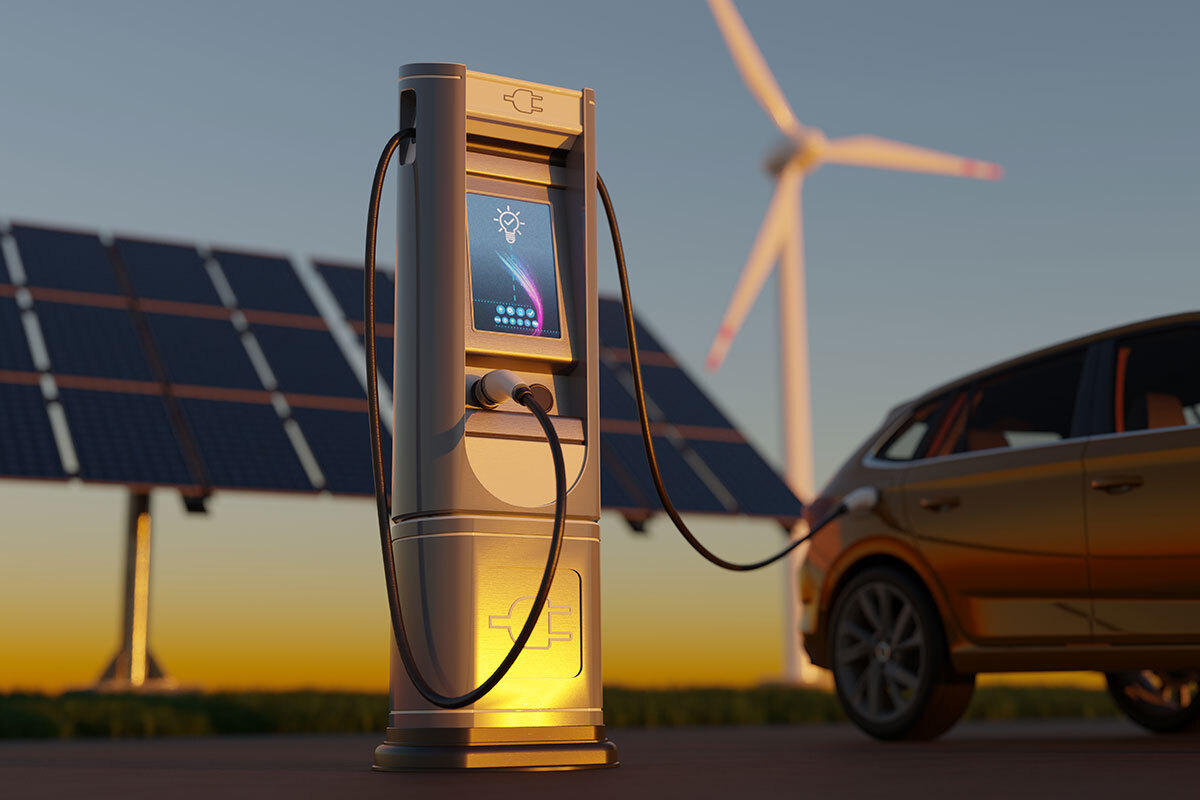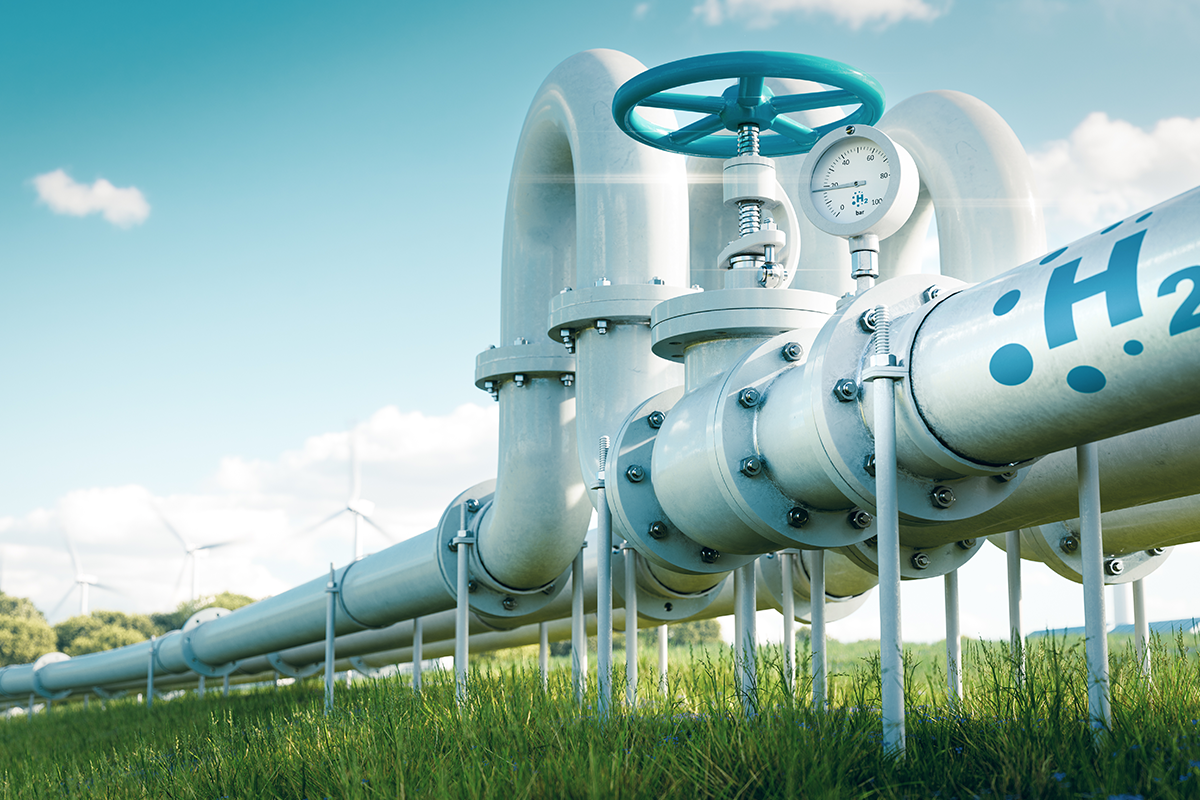-
Voltalia set a new plan last year to double its installed renewables capacity by 2027 to 5 gigawatts
-
Sébastien sees progress in Africa because of the energy crisis in South Africa and the hydrogen ambitions of countries such as Egypt
-
Europe is focused on geostrategic independence via locally produced solar and wind power
What made you join Voltalia and what first triggered your interest in sustainability?
I arrived in renewables by chance having been involved in small projects since the 1990s. In the beginning, it was just part of my work and today, 100% of deployment is renewables.
I worked on my first wind farm in California in 1994 while I was based in the US. When I returned to France in 1999, I was involved in wind and solar projects as well as highways, ports and pipelines.
I joined Voltalia at the end of 2011 as it was a way to fully concentrate on sustainable infrastructure and renewable energy in particular. It was becoming quite obvious at the time that renewables were cost competitive versus other energy sources.
The Paris Agreement in 2015 set out certain goals around limiting warming to 1.5 degrees Celsius. Are these goals still realistic given global emissions haven’t yet peaked, and the most recent IPCC assessment predicted we would soon cross the 1.5C threshold?
I have mixed feelings. I’m optimistic about a bigger market share of renewables within electricity generation and about the market share of electricity within the overall universe of energy consumption.
It moves at a pace that might be too slow but it’s the easiest part of the net zero equation because renewables are so cost effective.
Where I’m really doubtful is outside the world of electricity. Some transportation will be difficult to electrify. I’m also concerned about agriculture, which is a big challenge to decarbonize.
Voltalia is active in solar, wind, biomass and hydro, batteries and energy efficiency. Why has there been less development of biomass and hydro?
For the hydro sector, In many countries, the best sites are already taken, making progress difficult other than by buying existing assets but that doesn’t move the dial on climate change.
Biomass has similar challenges. It is better off for heating or transportation without going through electricity to avoid the conversion from wood to electricity and then electricity to heating, where you lose a lot of the potential.
Also, it should really be burned locally to avoid transportation emissions. On top of that, its best use is when you have nothing better to do with it. For instance, we are involved in biomass in Latin America and French Guyana where you don’t need heating. So either you leave it on the floor and it creates emissions or you burn it to produce electricity.
Our energy efficiency business is operated through our subsidiary Helexia, which specializes in solar rooftops for large buildings such as warehouses – anywhere with a big flat roof.
It offers building owners the chance to self-produce solar electricity onsite and to minimize electricity consumption through efficiency gains by redoing isolation and modernizing heating/cooling systems.
Helexia acts either as a service provider or as an owner of the solar rooftop and the energy efficiency investments and gets paid from the client’s energy savings.
Under the IEA’s net zero emissions by 2050 scenario, renewable share of generation needs to double from almost 29% in 2021 to more than 60%. How do we get there?
This is where I’m optimistic. It will happen fast provided two conditions are met. One is to speed up the permitting process with the biggest constraint being the ‘not in my backyard’ brigade or just too much bureaucracy. The second condition is to create a low risk environment for investors.
Risks can be lowered via long-term power purchase agreements or long-term contracts for difference which swap the fixed versus floating price of electricity. Low risk speeds up the construction of new plants and provides a low cost of capital.
Have you seen an uptick in inquiries due to energy dependence concerns around the Russia-Ukraine war?
Yes. I’ve long said that the renewables sector is driven by four growth engines: 1. governments who want to fight climate change; 2. cost competitiveness; 3. the growing global demand for electricity; 4. geostrategic independence via locally produced energy.
For the past 12 months, I see more questions on this subject.
Ultimately, the increased capacity in solar means Europe won’t be held hostage by Russia in future.
It is pretty clear that European electricity has mainly come from gas and coal plus some nuclear and renewables. Gas is not coming back. It would take a lot of time to fix the Nord Stream pipelines and for geopolitical reasons, even if there was regime change in Russia, I think Europe would be more cautious than before.
I don’t see coal production increasing because Europe is genuinely fighting climate change. That means we are left with more nuclear, solar and wind.
More nuclear is not possible in many European countries for historical reasons. And in countries where it is doable, it will take 20 years. There is an ambition to create small modular reactors but it’s currently just an ambition. For those countries that don’t have a nuclear authority, it can easily take 15 years to create one taking into account new laws, institutions, training specialists and hiring industry monitors.
Then there’s the issue of sourcing uranium. It’s a small portion of the cost of a nuclear kilowatt hour, but it is still essential to produce nuclear power and as of today, France imports a big portion of its uranium from Russia.
Nuclear is only independently produced electricity if you have raw materials, and Europe doesn’t produce uranium. For all of these reasons, the only way forward for Europe is to build as much renewable capacity as possible as fast as possible.
What are your future plans?
We set a new plan last year to double our installed renewables capacity by 2027 to 5 gigawatts and to significantly increase our services to third parties, which will add another 8 gigawatts for clients.
Historically, we have invested in wind but new projects are increasingly solar because in most countries it produces cheaper electricity.
But in all countries, you need a mix of renewables. We see progress in Africa because of the energy crisis in South Africa and the hydrogen ambitions of countries such as Egypt. Latin America especially Brazil continues to grow and it’s where we have the largest capacity today.
Do you think the US IRA and EU Green Deal Industrial Plan will provide the policy tailwind for the next leg up in renewables or will the market become less global due to protectionism?
Governments are one of the four growth engines I referred to earlier, so a faster engine benefits the whole industry but it is still only one out of four.
The IRA and Green Deal are both good for the industry yet it’s also possible to be good and protectionist. So, while these policies will boost growth, if they include too much protectionism, it means the US and Europe will have a higher cost of energy.
It would be good risk management to produce solar panels in more countries around the world because it creates stability, but we would need to make sure the countries which take market share from China are cost competitive in order to maintain cheap energy.
Where do you stand on the debate about long-term power purchase agreements (PPAs) for renewables versus pricing as a dynamic commodity market?
If all sources of energy compete for long-term PPAs, we would have the best of both worlds – the benefits of strong competition plus low cost of capital because producers like us will ask for a lower return on equity and the banks will accept higher leverage and lower interest rates because of the certainty provided by long-term PPAs.
It’s a well-designed, sophisticated market and it’s naïve to think that people will build power plants hoping that the spot price will be the same for the next 30 years to get a return.
Capex is not changing and isn’t dependent on the spot price, so strong competition for long-term contracts is the best outcome.
A good regulator will ask distributors of electricity to have a big chunk of their volume with long-term purchases exactly the same way as regulators ask banks who make long-term loans to do so with long-term borrowing.
Disclaimer
This content has been prepared by Nomura solely for information purposes, and is not an offer to buy or sell or provide (as the case may be) or a solicitation of an offer to buy or sell or enter into any agreement with respect to any security, product, service (including but not limited to investment advisory services) or investment. The opinions expressed in the content do not constitute investment advice and independent advice should be sought where appropriate.The content contains general information only and does not take into account the individual objectives, financial situation or needs of a person. All information, opinions and estimates expressed in the content are current as of the date of publication, are subject to change without notice, and may become outdated over time. To the extent that any materials or investment services on or referred to in the content are construed to be regulated activities under the local laws of any jurisdiction and are made available to persons resident in such jurisdiction, they shall only be made available through appropriately licenced Nomura entities in that jurisdiction or otherwise through Nomura entities that are exempt from applicable licensing and regulatory requirements in that jurisdiction. For more information please go to https://www.nomuraholdings.com/policy/terms.html.
